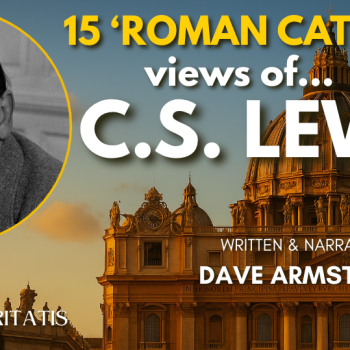
This exchange took place on the Debunking Christianity blog, underneath a post by John W. Loftus, called “No More Funerals!” Words of atheist “DagoodS” (whom I have met in person) will be in blue, and those of a second unknown atheist in green.
*****
We all would like people who truly deserve it to get what is coming to them, but wanting it to be so doesn’t make it true.
Nor does wanting hell to be untrue make it untrue.
Are your religious beliefs based on what you believe to be true or what you want to be true?
The former; however the latter is not to be immediately dismissed. The presence of thirst doesn’t disprove that there is water; sexual drives don’t prove there is no such thing as sex, etc. Likewise, a desire for God or for heaven is more likely to prove that there is a God and a heaven, in my mind, than that no God or heaven exist. The fact that we all seem to have this interior, gut-level sense of right and wrong and desire for justice suggests to me that there is absolute justice in the universe, grounded in God.
When I ponder a universe without God I truly wonder why it would be that this godless universe contains human beings on earth: some 90-95% of whom are religious, and virtually 100% feel that the universe has meaning and that certain things are right and wrong even though there is no basis upon which we are all bound to carry out this morality, unless there is a God.
Likewise, a desire for God or for heaven is more likely to prove that there is a God and a heaven, in my mind, than that no God or heaven exist.
Actually, this is exactly backwards. “Desire” is an outstanding motivator, but a horrible proof. If we desire something, this places us on notice that we have a bias, and should be more careful to remove that bias when attempting to ascertain the truth, not less because it is “more likely.”
Well, technically (epistemologically), the word suggest would have been a better choice here than prove. But I still say that the desire is more likely to correspond to the things that are desired actually existing, rather than non-existent. This was the point of the analogies that followed. It was not so much hard philosophical “proof” in mind as it was common sense and experience of our desires and whether or not they are able to be fulfilled. Peter Kreeft makes a long elaborate “argument from desire,” drawing from and expanding upon C. S. Lewis. I think it is a rather neglected argument in the Christian “arsenal.”
In high school, I may have desired the head cheerleader to want to date me, but the fact she glanced my way in class is not proof of my desire. Simply because we desire something to be true, does not make it true.
I didn’t say that it did (I fully agree; that would be most foolish indeed). Don’t take this criticism too far. I said that the desire, in my opinion, made it probably more likely that the desired end exists, than that it does not. This is obvious from life. So in your analogy above, you desired to have a date with the cheerleader. This proves that it is possible that such a thing as a date with the cheerleader exists. It may be unlikely, but it is untrue that the desire proves or suggests that the thing is absolutely unattainable or nonexistent: more so than the contrary (as you atheists would make out with regard to the theist longing for God and heaven).
We have no evidence of life after death. None. Near-death experiences don’t even come close.
Nor do we have any compelling evidence for the cause of the Big Bang. There are lots of things that don’t have evidence; for example, extraterrestrial life. But then again, you assume from the outset the unreasonable assumption that scientific knowledge is the only sort that gives us reliable information. You would deny the miraculous and revelation: precisely the things that we Christians would bring forth as evidence for life after death.
Therefore a “desire” for it is not a proof, but rather a warning we have painted a wish and now look for “proof” with anything that sticks.
It is a strong indication of existence, precisely on the analogical basis that I have described; particularly because the desire is so widespread, and even had many many defenders in the philosophical world, through the centuries.
I have said it before, I will say it again. The idea of this is not to pick the team with the snazziest uniforms and stick with them regardless of the score. Hey, the concept of a place where we will be with people we love and can socialize for all eternity, where wrongs will be avenged, and good acts rewarded is a great idea. So is a perpetual motion machine. Doesn’t make either true.
I didn’t say it did. My argument (based on analogies) is that a perpetual desire for something suggests that it is more likely than not that it actually exists.
***
(originally 12-2-06)
Photo credit: Pedro Szekely (10-6-12). Sunset in El Porto, California [Wikimedia Commons / Creative Commons Attribution-Share Alike 2.0 Generic license]
***













